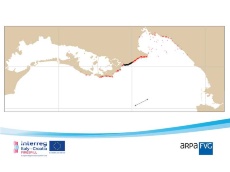Questo sito è in fase di dismissione. Consultare il nuovo sito www.arpa.fvg.it
#FIRESPILL: ARPA FVG (PP 11) è pronta per rispondere alle emergenze di oil spill
In ARPA FVG (PP 11), un flusso di calcolo ecFlow [1] per la produzione giornaliera degli input per il modello di oil spill GNOME [2] è stato sviluppato e reso operativo. Ogni giorno vengono preparati alcuni archivi compressi contenenti dati previsionali dei forzanti ambientali provenienti da diverse fonti, al fine di essere utilizzati in caso di emergenze derivanti dallo sversamento di inquinanti oleosi in ambiente marino.
Tali archivi contengono tutti i file di input necessari per far girare il modello GNOME tramite l’applicativo desktop. Pertanto, per poter utilizzare GNOME in supporto ad emergenze di oil spill, gli utenti devono solamente scaricare l’archivio giornaliero e impostare i dettagli del rilascio. Gli input previsionali per GNOME sono resi disponibili per ciascuna delle seguenti tre aree: il Golfo di Trieste e la Laguna di Marano-Grado (area pilota), il Nord Adriatico e l’intero Mare Adriatico.
Questa attività è stata condotta nel quadro dell’azione pilota “Oil spills and other marine hazards” del progetto Interreg IT-HR FIRESPILL [3, 4] e contribuisce al raggiungimento della deliverable D.4.3.1.
At ARPA FVG (PP 11), a computational ecFlow workflow [1] has been developed and it is operative for the daily production of the oil spill model GNOME [2] inputs. Compressed archives with forecasts of oil movers coming from different sources are prepared every day, in order for them to be used in case of an oil spill event in the marine environment.
Such archives contain all the input files requited to run the GNOME desktop version. Therefore, in order to run GNOME for emergency support, users just need to download the daily archive and set the spill details. GNOME inputs are made available for each of the following three areas: Trieste Gulf and Marano-Grado Lagoon (pilot area), North Adriatic, and full Adriatic Sea.
This activity has been carried on in the context of “Oil spills and other marine hazards” pilot of the Interreg IT-HR FIRESPILL project [3, 4], and it contributes to the deliverable D.4.3.1.
Riferimenti - References
[1] ecFlow
[2] GNOME model












